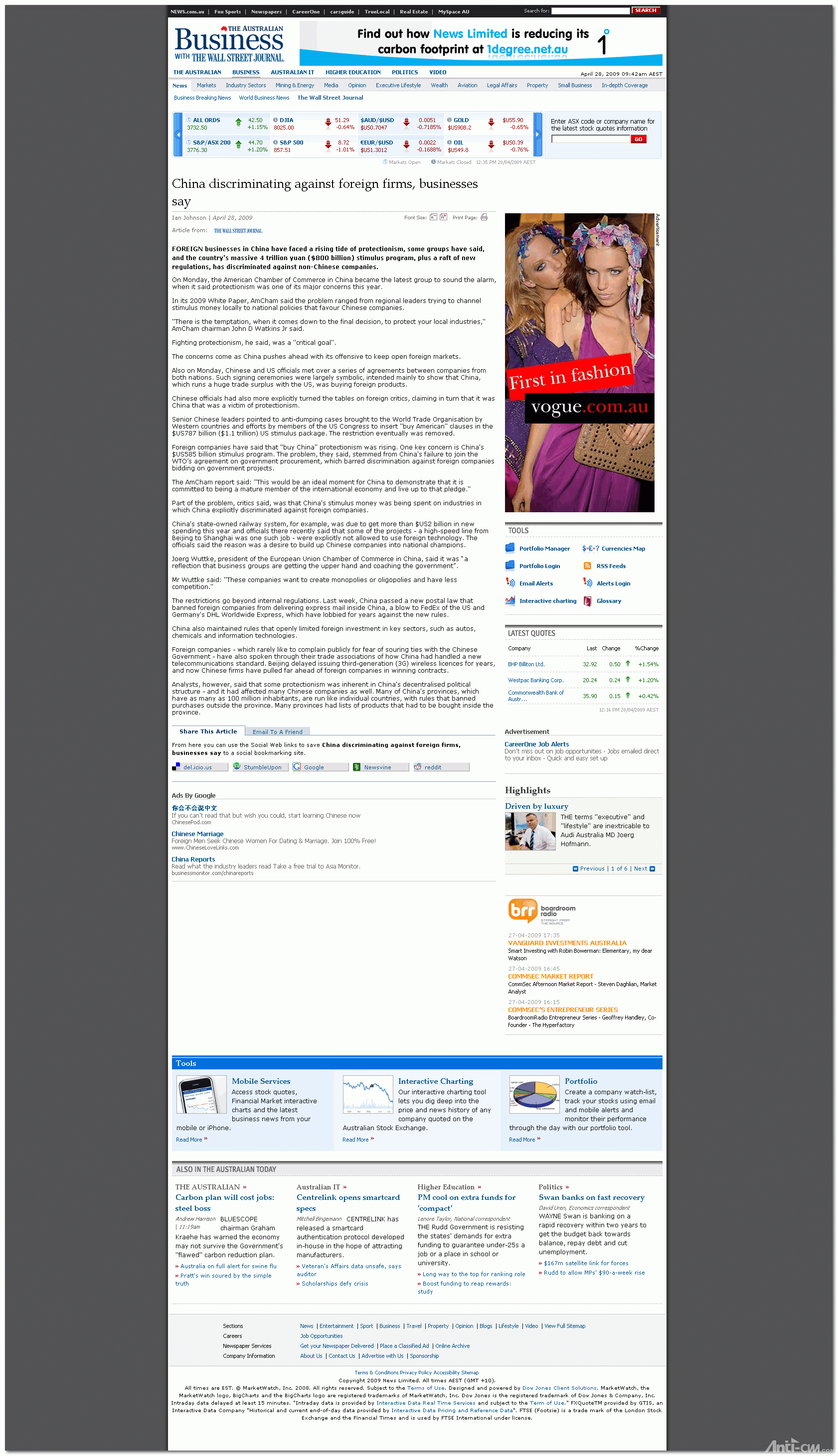|
|
本帖最后由 I'm_zhcn 于 2009-4-29 12:31 编辑
China discriminating against foreign firms, businesses say
http://www.theaustralian.news.com.au/business/story/0,28124,25397613-36375,00.html
Ian Johnson | April 28, 2009
FOREIGN businesses in China have faced a rising tide of protectionism, some groups have said, and the country's massive 4 trillion yuan ($800 billion) stimulus program, plus a raft of new regulations, has discriminated against non-Chinese companies.
On Monday, the American Chamber of Commerce in China became the latest group to sound the alarm, when it said protectionism was one of its major concerns this year.
In its 2009 White Paper, AmCham said the problem ranged from regional leaders trying to channel stimulus money locally to national policies that favour Chinese companies.
"There is the temptation, when it comes down to the final decision, to protect your local industries," AmCham chairman John D Watkins Jr said.
Fighting protectionism, he said, was a "critical goal".
The concerns come as China pushes ahead with its offensive to keep open foreign markets.
Also on Monday, Chinese and US officials met over a series of agreements between companies from both nations. Such signing ceremonies were largely symbolic, intended mainly to show that China, which runs a huge trade surplus with the US, was buying foreign products.
Chinese officials had also more explicitly turned the tables on foreign critics, claiming in turn that it was China that was a victim of protectionism.
Senior Chinese leaders pointed to anti-dumping cases brought to the World Trade Organisation by Western countries and efforts by members of the US Congress to insert "buy American" clauses in the $US787 billion ($1.1 trillion) US stimulus package. The restriction eventually was removed.
Foreign companies have said that "buy China" protectionism was rising. One key concern is China's $US585 billion stimulus program. The problem, they said, stemmed from China's failure to join the WTO’s agreement on government procurement, which barred discrimination against foreign companies bidding on government projects.
The AmCham report said: "This would be an ideal moment for China to demonstrate that it is committed to being a mature member of the international economy and live up to that pledge."
Part of the problem, critics said, was that China's stimulus money was being spent on industries in which China explicitly discriminated against foreign companies.
China's state-owned railway system, for example, was due to get more than $US2 billion in new spending this year and officials there recently said that some of the projects - a high-speed line from Beijing to Shanghai was one such job - were explicitly not allowed to use foreign technology. The officials said the reason was a desire to build up Chinese companies into national champions.
Joerg Wuttke, president of the European Union Chamber of Commerce in China, said it was “a reflection that business groups are getting the upper hand and coaching the government”.
Mr Wuttke said: "These companies want to create monopolies or oligopolies and have less competition."
The restrictions go beyond internal regulations. Last week, China passed a new postal law that banned foreign companies from delivering express mail inside China, a blow to FedEx of the US and Germany's DHL Worldwide Express, which have lobbied for years against the new rules.
China also maintained rules that openly limited foreign investment in key sectors, such as autos, chemicals and information technologies.
Foreign companies - which rarely like to complain publicly for fear of souring ties with the Chinese Government - have also spoken through their trade associations of how China had handled a new telecommunications standard. Beijing delayed issuing third-generation (3G) wireless licences for years, and now Chinese firms have pulled far ahead of foreign companies in winning contracts.
Analysts, however, said that some protectionism was inherent in China's decentralised political structure - and it had affected many Chinese companies as well. Many of China's provinces, which have as many as 100 million inhabitants, are run like individual countries, with rules that banned purchases outside the province. Many provinces had lists of products that had to be bought inside the province.
【截图】

|
against, businesses, firms, foreign, Say, against, businesses, firms, foreign, Say, against, businesses, firms, foreign, Say
评分
-
1
查看全部评分
-
|